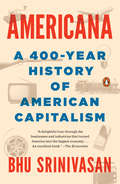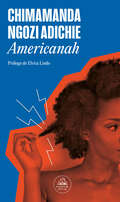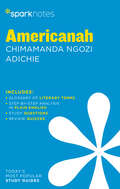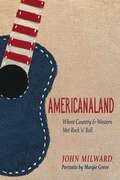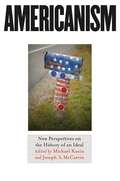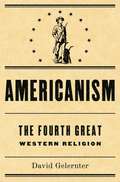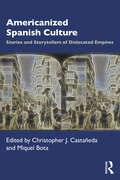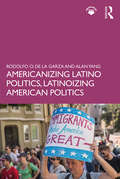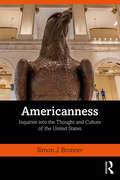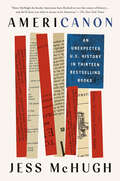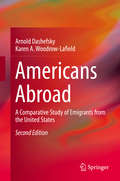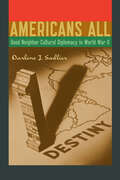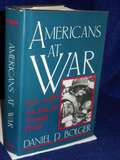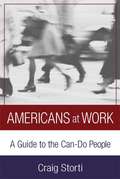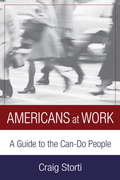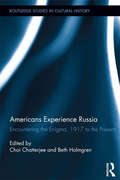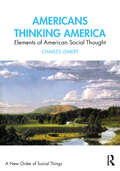- Table View
- List View
Americana Portrait Sessions
by Jeff FasanoAmericana Portrait Sessions is the first photography book to take a comprehensive view of contemporary Americana music. The collection features intimate portraits that reveal the strength, heart, and soul of nearly two hundred great artists from the big tent that is Americana music, all shot through the expert lens of Jeff Fasano. Fasano's unparalleled access to Americana artists like Sheryl Crow, Rhiannon Giddens, Vince Gill, Keb' Mo', Judy Collins, John Oates, The Avett Brothers, The McCrary Sisters, Lucinda Williams, Margo Price, Blind Boys of Alabama, and Kris Kristofferson gives Americana Portrait Sessions the kind of authority that comes from true reach into the breadth of the genre. But this collection is as important for the artists few fans know as for the ones with successful careers behind them. While the book champions the diversity of race, gender, sexuality, and age inherent in Americana music, it also spans career arcs to bring lesser-known acts into the spotlight.Americana Portrait Sessions brings you backstage to the greenrooms and quiet corners where artists like The War and Treaty, Jewel, Jason Isbell, and The Wooten Brothers aren't just artists performing, but people hanging out.
Americana Soul: Homes Designed with Love, Comfort, and Intention
by Luke CaldwellEnter the world of Luke Caldwell, founder of the Timber and Love design and build firm and HGTV star of Boise Boys and Outgrown, as he shares his intentional design philosophy for creating timeless and organic home designs in this aspirational and accessible book.If you&’ve seen the popular HGTV shows Boise Boys and Outgrown, you&’ll know Luke Caldwell&’s passion for natural materials and comfortable spaces that are warm, inviting, livable, and beautiful at the same time. Now with Americana Soul, you can make those designs work for you. Organized by design style—Timber and Love, Natural and Organic, and Classic and Cozy—Luke&’s book is filled with photography that showcases the bones and flow of the spaces as well as the details that make them unique. Americana Soul showcases Luke&’s passion for design including curated personal collections and vintage finds, natural stone walls and fireplaces, and exposed wood beams, in a way that will inspire you to create your own.
Americana: A 400-Year History of American Capitalism
by Bhu SrinivasanFrom the days of the Mayflower and the Virginia Company, America has been a place for people to dream, invent, build, tinker, and bet the farm in pursuit of a better life. Americana takes us on a four-hundred-year journey of this spirit of innovation and ambition through a series of Next Big Things -- the inventions, techniques, and industries that drove American history forward: from the telegraph, the railroad, guns, radio, and banking to flight, suburbia, and sneakers, culminating with the Internet and mobile technology at the turn of the twenty-first century. The result is a thrilling alternative history of modern America that reframes events, trends, and people we thought we knew through the prism of the value that, for better or for worse, this nation holds dearest: capitalism. In a winning, accessible style, Bhu Srinivasan boldly takes on four centuries of American enterprise, revealing the unexpected connections that link them. We learn how Andrew Carnegie's early job as a telegraph messenger boy paved the way for his leadership of the steel empire that would make him one of the nation's richest men; how the gunmaker Remington reinvented itself in the postwar years to sell typewriters; how the inner workings of the Mafia mirrored the trend of consolidation and regulation in more traditional business; and how a 1950s infrastructure bill triggered a series of events that produced one of America's most enduring brands: KFC. Reliving the heady early days of Silicon Valley, we are reminded that the start-up is an idea as old as America itself.Entertaining, eye-opening, and sweeping in its reach, Americana is an exhilarating new work of narrative history.
Americana: Dispatches from the New Frontier
by Hampton SidesHarley-Davidson bikers . . . Grand Canyon river rats. . .Mormon archaeologists. . . Spelling bee prodigies...For more than fifteen years, best-selling author and historian Hampton Sides has traveled widely across the continent exploring the America that lurks just behind the scrim of our mainstream culture. Reporting for Outside, The New Yorker, and NPR, among other national media, the award-winning journalist has established a reputation not only as a wry observer of the contemporary American scene but also as one of our more inventive and versatile practitioners of narrative non-fiction.In these two dozen pieces, collected here for the first time, Sides gives us a fresh, alluring, and at times startling America brimming with fascinating subcultures and bizarre characters who could live nowhere else. Following Sides, we crash the redwood retreat of an apparent cabal of fabulously powerful military-industrialists, drop in on the Indy 500 of bass fishing, and join a giant techno-rave at the lip of the Grand Canyon. We meet a diverse gallery of American visionaries-- from the impossibly perky founder of Tupperware to Indian radical Russell Means to skateboarding legend Tony Hawk. We retrace the route of the historic Bataan Death March with veterans from Sides' acclaimed WWII epic, Ghost Soldiers. Sides also examines the nation that has emerged from the ashes of September 11, recounting the harrowing journeys of three World Trade Center survivors and deciding at the last possible minute not to "embed" on the Iraqi front-lines with the U.S. Marines. Americana gives us a sparkling mosaic of our country today, in all its wild and poignant charm.ist; mushes the Iditarod Trail with Alaska legend Joe Redington. AMERICAN EDENS. . . runs the rapids during a man-made flood in the Grand Canyon; crashes the redwood retreat of California's elite Bohemian Club; debriefs the "bio-nauts" as they emerge from captivity in the Biosphere; dives into America's greatest swimming hole; gets ecstatic with the Zippies at their secret all-night techno-rave. AMERICAN RIDES. . . ponders silver bubbles at the annual Airstream RV convention; revs it up at the Harley-Davidson rally in Sturgis, South Dakota; sails the Chesapeake with snooty owners of a rare antique sailboat known as the log canoe; roams the streets with D.C.'s hard-core band of bike couriers. AMERICAN BY BIRTH, SOUTHERN BY THE GRACE OF . . .. . . speaks in tongues with black Pentecostalists of the Memphis-based Church of God in Christ; fishes for lunkers at the Bassmasters Classic; goes underground with the world's greatest cave rescuer; unravels the mystery of a notorious teen murder in rural Mississippi. AMERICANS ABROAD. . . crosses the Sahara Desert with American endurance runners at the infernal Marathon des Sables; bushwhacks through MesoAmerica with Mormon archaeologists in search of lost tribes of Israel; visits a high school friend who's become an Uzi-toting Zionist pioneer in the West Bank; walks the route of the Bataan Death March with characters from Ghost Soldiers. AMERICAN OBSESSIONS. . . cranks it up with high-end stereophiles at the Consumer Electronics Show in Las Vegas; gets bowled over by 5,000 squealing salesladies at the annual Tupperware convention; plumbs the mysteries of the "schwa" at the National Spelling Bee; scrapes at the stucco of the neurotic architectural tradition known as Santa Fe Style. AMERICA, POST 9/11. . . traces the harrowing stories of three World Trade Center survivors; goes off-roading in the Imperial Sand Dunes; almost embeds on the Iraqi frontlines with the U.S. Marines; remembers Shane Childers, the decorated Marine who became the first American combat death in Iraq.From the Trade Paperback edition.
Americana: The Kinks, the Riff, the Road: The Story
by Ray DaviesAs a boy in post-War England, legendary Kinks singer/songwriter Ray Davies fell in love with America—its movies and music, its culture of freedom, fed his imagination. Then, as part of the British Invasion, he toured the US with the Kinks during one of the most tumultuous eras in recent history—until the Kinks group was banned from performing there from 1965-69. Many tours and trips later, while living in New Orleans, he experienced a transformative event: the shooting (a result of a botched robbery) that nearly took his life. In Americana, Davies tries to make sense of his long love-hate relationship with the country that both inspired and frustrated him. From his quintessentially English perspective as a Kink, Davies—with candor, humor, and wit—takes us on a very personal road trip through his life and storied career as a rock star, and reveals what music, fame, and America really mean to him. Some of the most fascinating characters in recent pop culture make appearances, from the famous to the perhaps even-more-interesting behind-the-scenes players. The book also includes a photographic insert with images from Daviess own collection from the bands archive.
Americanah
by Chimamanda Ngozi AdichieUna original historia sobre la inmigración en Estados Unidos desde el punto de vista de una estudiante de literatura nigeriana. Lagos, mediados de los noventa. En el marco de una dictadura militar y en una Nigeria que ofrece poco o ningún futuro, Ifemelu y Obinze, dos adolescentes atípicos, se enamoran apasionadamente. Como gran parte de su generación, saben que antes o después tendrán que dejar el país. Obinze siempre ha soñado con vivir en Estados Unidos, pero es Ifemelu quien consigue el visado para vivir con su tía en Brooklyn y estudiar en la universidad. Mientras Obinze lucha contra la burocracia para reunirse con Ifemelu, ella se encuentra en una América donde nada es como se imaginaba, comenzando por la importancia del color de su piel. Todas sus experiencias, desgracias y aventuras conducen a una única pregunta: ¿acabará convirtiéndose en una «americanah»? Americanah, que recoge el término burlón con que los nigerianos se refieren a los que vuelven de Estados Unidos dándose aires, es una historia de amor a lo largo de tres décadas y tres continentes, la historia de cómo se crea una identidad al margen de los dictados de la sociedad y sus prejuicios. Reseñas:«Confirma el virtuosismo, la empatía sin límites y la punzante agudeza social de Adichie.»Dave Eggers «Hay algunas novelas que cuentan una gran historia y otras que consiguen que cambies la manera que tienes de ver el mundo. Americanah, de Chimamanda Ngozi Adichie, consigue las dos cosas.»Elisabeth Day, The Guardian «Americanah es esa cosa rara en la ficción literaria contemporánea: una exuberante historia de amor que también es una crítica social penetrante y divertida [...]. Adichie escribe con perspicacia.»Vogue
Americanah SparkNotes Literature Guide (SparkNotes Literature Guide Series)
by SparkNotesCreated by Harvard students for students everywhere, SparkNotes give you just what you need to succeed in school: Complete Plot Summary and AnalysisKey Facts About the WorkAnalysis of Major CharactersThemes, Motifs, and SymbolsExplanation of Important QuotationsAuthor&’s Historical ContextSuggested Essay Topics25-Question Review QuizAmericanah features explanations of key themes, motifs, and symbols including: the importance of authenticity; race and racism; the male peacock; reading and novels; lies; hair. It also includes detailed analysis of these important characters: Ifemelu; Obinze; Dike; Aunty Uju.
Americanaland: Where Country & Western Met Rock 'n' Roll (Music in American Life #1)
by John MilwardA musical genre forever outside the lines With a claim on artists from Jimmie Rodgers to Jason Isbell, Americana can be hard to define, but you know it when you hear it. John Milward’s Americanaland is filled with the enduring performers and vivid stories that are at the heart of Americana. At base a hybrid of rock and country, Americana is also infused with folk, blues, R&B, bluegrass, and other types of roots music. Performers like Bob Dylan, Johnny Cash, Ray Charles, and Gram Parsons used these ingredients to create influential music that took well-established genres down exciting new roads. The name Americana was coined in the 1990s to describe similarly inclined artists like Emmylou Harris, Steve Earle, and Wilco. Today, Brandi Carlile and I’m With Her are among the musicians carrying the genre into the twenty-first century. Essential and engaging, Americanaland chronicles the evolution and resonance of this ever-changing amalgam of American music. Margie Greve’s hand-embroidered color portraits offer a portfolio of the pioneers and contemporary practitioners of Americana.
Americanas: "We Always Want More"
by Boris Groysberg Sarah L. AbbottBeto Sicupira had joined Americanas, a leading retailer in Brazil, in 1981. 2021 marked forty years since Sicupira's arrival, and the anniversary prompted him to reflect on what had been accomplished and on where the organization was headed. Americanas' growth strategy was centered around offering an increasing assortment of products and services through a broad range of channels. Was this the right strategy to ensure Americanas' success going forward?
Americanism
by Michael Kazin Joseph A. MccartinWhat is Americanism? The contributors to this volume recognize Americanism in all its complexity--as an ideology, an articulation of the nation's rightful place in the world, a set of traditions, a political language, and a cultural style imbued with political meaning. In response to the pervasive vision of Americanism as a battle cry or a smug assumption, this collection of essays stirs up new questions and debates that challenge us to rethink the model currently being exported, too often by force, to the rest of the world.Crafted by a cast of both rising and renowned intellectuals from three continents, the twelve essays in this volume are divided into two sections. The first group of essays addresses the understanding of Americanism within the United States over the past two centuries, from the early republic to the war in Iraq. The second section provides perspectives from around the world in an effort to make sense of how the national creed and its critics have shaped diplomacy, war, and global culture in the twentieth and twenty-first centuries. Approaching a controversial ideology as both scholars and citizens, many of the essayists call for a revival of the ideals of Americanism in a new progressive politics that can bring together an increasingly polarized and fragmented citizenry.Contributors:Mia Bay, Rutgers UniversityJun Furuya, Hokkaido University, JapanGary Gerstle, University of MarylandJonathan M. Hansen, Harvard UniversityMichael Kazin, Georgetown UniversityRob Kroes, University of AmsterdamMelani McAlister, The George Washington UniversityJoseph A. McCartin, Georgetown UniversityAlan McPherson, Howard UniversityLouis Menand, Harvard UniversityMae M. Ngai, University of ChicagoRobert Shalhope, University of OklahomaStephen J. Whitfield, Brandeis UniversityAlan Wolfe, Boston CollegeWhat is Americanism? The contributors to this volume recognize Americanism in all its complexity--as an ideology, an articulation of the nation's rightful place in the world, a set of traditions, a political language, and a cultural style imbued with political meaning. In response to the pervasive vision of Americanism as a battle cry or a smug assumption, this collection of essays stirs up new questions and debates that challenge us to rethink the model currently being exported, too often by force, to the rest of the world.Approaching a controversial ideology as both scholars and citizens, many of the essayists call for a revival of the ideals of Americanism in a new progressive politics that can bring together an increasingly polarized and fragmented citizenry. The contributors are Mia Bay, Jun Furuya, Gary Gerstle, Jonathan M. Hansen, Michael Kazin, Rob Kroes, Melani McAlister, Joseph A. McCartin, Alan McPherson, Louis Menand, Mae M. Ngai, Robert Shalhope, Stephen J. Whitfield, and Alan Wolfe. The editors are Michael Kazin and Joseph A. McCartin.-->
Americanism in the Twenty-First Century
by Deborah J. SchildkrautThis book explores public opinion about being and becoming American, and its implications for contemporary immigration debates. It focuses on the causes and consequences of two aspects of American identity: how people define being American and whether people think of themselves primarily as American rather than as members of a panethnic or national origin group. Importantly, the book evaluates the claim - made by scholars and pundits alike - that all Americans should prioritize their American identity instead of an ethnic or national origin identity. It finds that national identity within American democracy can be a blessing or a curse. It can enhance participation, trust, and obligation. But it can be a curse when perceptions of deviation lead to threat and resentment. It can also be a curse for minorities who are attached to their American identity but also perceive discrimination. The notion of American identity is a predisposition that the government has good reason to cultivate, but also good reason to approach with caution.
Americanism: The Fourth Great Western Religion
by David GelernterWhat does it mean to "believe" in America? Why do we always speak of our country as having a mission or purpose that is higher than other nations? Modern liberals have invested a great deal in the notion that America was founded as a secular state, with religion relegated to the private sphere. David Gelernter argues that America is not secular at all, but a powerful religious idea--indeed, a religion in its own right. Gelernter argues that what we have come to call "Americanism" is in fact a secular version of Zionism. Not the Zionism of the ancient Hebrews, but that of the Puritan founders who saw themselves as the new children of Israel, creating a new Jerusalem in a new world. Their faith-based ideals of liberty, equality, and democratic governance had a greater influence on the nation's founders than the Enlightenment. Gelernter traces the development of the American religion from its roots in the Puritan Zionism of seventeenth-century New England to the idealistic fighting faith it has become, a militant creed dedicated to spreading freedom around the world. The central figures in this process were Abraham Lincoln, Teddy Roosevelt, and Woodrow Wilson, who presided over the secularization of the American Zionist idea into the form we now know as Americanism. If America is a religion, it is a religion without a god, and it is a global religion. People who believe in America live all over the world. Its adherents have included oppressed and freedom-loving peoples everywhere--from the patriots of the Greek and Hungarian revolutions to the martyred Chinese dissidents of Tiananmen Square. Gelernter also shows that anti-Americanism, particularly the virulent kind that is found today in Europe, is a reaction against this religious conception of America on the part of those who adhere to a rival religion of pacifism and appeasement. A startlingly original argument about the religious meaning of America and why it is loved--and hated--with so much passion at home and abroad.
Americanized Spanish Culture: Stories and Storytellers of Dislocated Empires
by Christopher J. CastañedaAmericanized Spanish Culture explores the intricate transcultural dialogue between Spain and the United States since the late 19th century. The term "Americanized" reflects the influence of American cultural traits, ideas, and tendencies on individuals, institutions, and creative works that have moved back and forth between Spain and the United States. Although it is often defined narrowly as the result of a process of cultural imperialism, colonization, assimilation, and erasure, this book uses the term more expansively to explore representations of the transcultural mixing of Spanish and American culture in which the American influence might seem dominant but may also be the one that is shaped. The chapters in this volume highlight the lives of fascinating individuals, ideologies, and artistry that represent important themes in this transnational relationship of dislocated empires. The contributors represent a wide array of perspectives and life experiences, giving breadth, depth, and realism to their observations and analysis. Organized in two parts of five chapters each, this volume offers a unique perspective on the intermixing and intermingling of Spanish and American social, cultural, and literary traits and characteristics. This book will be of interest to students of United States and Spanish history, Iberian and Hispanic American studies, and cultural studies.
Americanized: Rebel Without A Green Card
by Sara Saedi<P>The hilarious, poignant, true story of one teen's experience growing up in America as an undocumented immigrant from the Middle East. <P>At thirteen, bright-eyed, straight-A student Sara Saedi uncovered a terrible family secret: she was breaking the law simply by living in the United States. Only two years old when her parents fled Iran, she didn't learn of her undocumented status until her older sister wanted to apply for an after-school job, but couldn't because she didn't have a Social Security number. <P>Fear of deportation kept Sara up at night, but it didn't keep her from being a teenager. She desperately wanted a green card, along with clear skin, her own car, and a boyfriend. <P>From discovering that her parents secretly divorced to facilitate her mother's green card application to learning how to tame her unibrow, Sara pivots gracefully from the terrifying prospect that she might be kicked out of the country to the almost-as-terrifying possibility that she might be the only one without a date to the prom. This moving, often hilarious story is for anyone who has ever shared either fear.
Americanizing Latino Politics, Latinoizing American Politics
by Rodolfo O. de la Garza Alan S. YangUsing the most extensive and currently available survey opinion data, this book empirically supports the argument that Latinos have emerged as a convergent panethnic political group, beyond the individual national origin identities dating to the time of the 1990 Latino National Political Survey when Mexican Americans, Puerto Ricans, and Cuban Americans were treated conceptually as politically distinct groups. Replete with data and supplemented by an extensive online resource, this book offers scholars, students, and sophisticated general readers evidence and inspiration for understanding the dynamics of Latino politics in the U.S. today.
Americanness: Inquiries into the Thought and Culture of the United States
by Simon J. BronnerAmericanness: Inquiries into the Thought and Culture of the United States analyzes several core themes that connect Americans because of, and despite, their pronounced diversity. The book investigates shared ideas and ideals, such as individualism, mobility, materialism, and future-orientation, that drive an overarching American worldview. Simon J. Bronner begins with ideas of space and time as they formed and changed through the history of the United States, before moving to the emergence of modern American culture. He examines reasons America is characterized as having a "victory culture" that extends to the American legal, military, and business complexes. This victory culture is further analyzed by looking at the country’s relationship with the game of football—a sport that thrives in America but has not caught on in other countries. Finally, the volume probes American consumerism driven by a desire for individual prosperity in a supposedly egalitarian society. Using interdisciplinary approaches drawn from psychology, sociology, ethnology, and history, Bronner seeks explanations for people invoking, and evoking, ideas that they perceive as American. This book would be an invaluable addition to courses on American history, sociology, cultural studies, and American studies.
Americanon: An Unexpected U.S. History in Thirteen Bestselling Books
by Jess McHugh&“An elegant, meticulously-researched and eminently readable history of the books that define us as Americans. For history buffs and book-lovers alike, McHugh offers us a precious gift.&”—Jake Halpern, Pulitzer Prize Winner and New York Times Bestselling author &“With her usual eye for detail and knack for smart storytelling, Jess McHugh takes a savvy and sensitive look at the 'secret origins' of the books that made and defined us…. You won't want to miss a one moment of it.&”—Brian Jay Jones, author of Becoming Dr. Seuss and the New York Times Bestselling Jim HensonThe true, fascinating, and remarkable history of thirteen books that defined a nation. Surprising and delightfully engrossing, Americanon explores the true history of thirteen of the nation&’s most popular books. Overlooked for centuries, our simple dictionaries, spellers, almanacs, and how-to manuals are the unexamined touchstones for American cultures and customs. These books sold tens of millions of copies and set out specific archetypes for the ideal American, from the self-made entrepreneur to the humble farmer. Benjamin Franklin&’s Autobiography, How to Win Friends and Influence People, Webster's Dictionary, Emily Post&’s Etiquette: Americanon looks at how these ubiquitous books have updated and reemphasized potent American ideals—about meritocracy, patriotism, or individualism—at crucial moments in history. Old favorites like the Old Farmer&’s Almanac and Betty Crocker&’s Picture Cook Book are seen in this new way—not just as popular books but as foundational texts that shaped our understanding of the American story. Taken together, these books help us understand how their authors, most of them part of a powerful minority, attempted to construct meaning for the majority. Their beliefs and quirks—as well as personal interests, prejudices, and often strange personalities—informed the values and habits of millions of Americans, woven into our cultural DNA over generations of reading and dog-earing. Yet their influence remains uninvestigated. Until now. What better way to understand a people than to look at the books they consumed most, the ones they returned to repeatedly, with questions about everything from spelling to social mobility to sex? This fresh and engaging book is American history as you&’ve never encountered it before.
Americans Abroad: A Comparative Study of Emigrants from the United States
by Arnold Dashefsky Karen A. Woodrow-LafieldThis book takes a new look at the study of emigration since publication of Americans Abroad in 1992. The US receives a high volume of immigrants, but its emigrant population is less frequently studied. International migration continues to increase, with now over 200 million people worldwide living as emigrants from their birth country for the purposes of work, family integration, improved living situations, or human rights. Utilizing the same social psychological approach that made the first edition so successful, the authors examine the motivation, adjustment issues and return migration of American emigrants. The analysis of these comparative experiences reveals core elements of American culture. With a new introductory chapter, a Foreword, and two Postscripts on US emigrants in Australia and Israel, the second edition builds on the strengths of the first edition to provide an important resource for the current state of US emigration. New topics covered include: what groups are emigrating from the US and why; rising departures and emigration of unauthorized immigrants; perceptions of US population about living abroad; US laws, dual citizenship, taxation, and transnationalism; famous US emigrants; and trends/projections for the future.
Americans All: Good Neighbor Cultural Diplomacy in World War II
by Darlene J. SadlierCultural diplomacy—&“winning hearts and minds&” through positive portrayals of the American way of life—is a key element in U.S. foreign policy, although it often takes a backseat to displays of military might. Americans All provides an in-depth, fine-grained study of a particularly successful instance of cultural diplomacy—the Office of the Coordinator of Inter-American Affairs (CIAA), a government agency established by President Franklin D. Roosevelt in 1940 and headed by Nelson A. Rockefeller that worked to promote hemispheric solidarity and combat Axis infiltration and domination by bolstering inter-American cultural ties. Darlene J. Sadlier explores how the CIAA used film, radio, the press, and various educational and high-art activities to convince people in the United States of the importance of good neighbor relations with Latin America, while also persuading Latin Americans that the United States recognized and appreciated the importance of our southern neighbors. She examines the CIAA&’s working relationship with Hollywood&’s Motion Picture Society of the Americas; its network and radio productions in North and South America; its sponsoring of Walt Disney, Orson Welles, John Ford, Gregg Toland, and many others who traveled between the United States and Latin America; and its close ties to the newly created Museum of Modern Art, which organized traveling art and photographic exhibits and produced hundreds of 16mm educational films for inter-American audiences; and its influence on the work of scores of artists, libraries, book publishers, and newspapers, as well as public schools, universities, and private organizations.
Americans At War 1975-1986: An Era Of Violent Peace
by Daniel P. BolgerDiscusses American military capabilities and operations undertaken since the end of the Vietnam War, detailing the tactics, the planning, the leadership, and the political realities that lead to the rise of the "limited engagement."
Americans At Work: A Guide To The Can-do People
by Craig StortiWhether you work with Americans face-to-face, communicate with them by telephone or e-mail or interact together in a virtual team, Americans at Work reveals the subtle and the not-so-subtle aspects of American culture in the workplace. Best-selling author Craig Storti provides historical perspectives and explanations of the six most important American cultural themes and their relevance to the workplace: "Land of Opportunity" (a driven people), "Go-for-It Mentality" (ready, fire, aim; new is better), "Equality for All" (but don't forget who's boss), "The Drive to Achieve" (nice guys finish last), "Live and Let Live" (do your own thing), "Time Matters" (obsession with efficiency). Learn about striaght talk, American style, and how Americans aren't always as direct as they say they are. Find out why Americans are deeply conflicted about power: they crave it but are loath to be caught craving it. See how Americans view outsiders. Gain tips for succeeding in the American work environment. Finally, get the basics of work-related etiquette: conducting meetings, giving feedback, nonverbal communication, e-mail rules, gifts, taboo topics and so on. Knowing how Americans work with each other will help you predict their reactions and, more important, their expectations of you. And if you are American, you will be better understand your own behavior and be able to work more effectively with collegues from other cultures.
Americans At Work: A Guide to the Can-Do People
by Craig StortiWhether you work with Americans face-to-face, communicate with them by telephone or e-mail or interact together in a virtual team, Americans at Work reveals the subtle and the not-so-subtle aspects of American culture in the workplace. Best-selling author Craig Storti provides historical perspectives and explanations of the six most important American cultural themes and their relevance to the workplace: "Land of Opportunity" (a driven people), "Go-for-It Mentality" (ready, fire, aim; new is better), "Equality for All" (but don't forget who's boss), "The Drive to Achieve" (nice guys finish last), "Live and Let Live" (do your own thing), "Time Matters" (obsession with efficiency). Learn about striaght talk, American style, and how Americans aren't always as direct as they say they are. Find out why Americans are deeply conflicted about power: they crave it but are loath to be caught craving it. See how Americans view outsiders. Gain tips for succeeding in the American work environment. Finally, get the basics of work-related etiquette: conducting meetings, giving feedback, nonverbal communication, e-mail rules, gifts, taboo topics and so on. Knowing how Americans work with each other will help you predict their reactions and, more important, their expectations of you. And if you are American, you will be better understand your own behavior and be able to work more effectively with collegues from other cultures.
Americans Experience Russia: Encountering the Enigma, 1917 to the Present (Routledge Studies in Cultural History)
by Choi Chatterjee Beth HolmgrenAmericans Experience Russia analyzes how American scholars, journalists, and artists envisioned, experienced, and interpreted Russia/the Soviet Union over the last century. While many histories of diplomatic, economic, and intellectual connections between the United States and the Soviet Union can be found, none has yet examined how Americans’ encounters with Russian/Soviet society shaped their representations of a Russian/Soviet ‘other’ and its relationship with an American ‘west.’ The essays in this volume critically engage with postcolonial theories which posit that a self-valorizing, unmediated west dictated the colonial encounter, repressing native voices that must be recovered. Unlike western imperialists and their colonial subjects, Americans and Russians long co-existed in a tense parity, regarding each other as other-than-European equals, sometime cultural role models, temporary allies, and political antagonists. In examining the fiction, film, journalism, treatises, and histories Americans produced out of their ‘Russian experience,’ the contributors to this volume closely analyze these texts, locate them in their sociopolitical context, and gauge how their producers’ profession, politics, gender, class, and interaction with native Russian interpreters conditioned their authored responses to Russian/Soviet reality. The volume also explores the blurred boundaries between national identities and representations of self/other after the Soviet Union’s fall.
Americans Move West (How America Became America)
by Teresa LaclairThe United States' boundaries have expanded over the centuries--and at the same time, Americans' ideas about their country have grown as well. The nation the world knows today was shaped by centuries of thinkers and events. In the 1830s, over fifty years after the United States had won its independence from Britain, Americans were still delighted with their young country. That sense of hope and freedom are still a part of the United States today. As you learn about the settlers who rode the Oregon Trail to new land in the West, you will gain a better understanding of how America became America
Americans Thinking America: Elements of American Social Thought (A New Order of Social Things)
by Charles LemertIn this dynamic book, Charles Lemert elaborates a vigorous, distinctive, and creative American tradition in social thought.American social theory has tended to be overshadowed by European social thought. Yet, looking deeper, Americans have always made important contributions to social theory. Drawing upon the work of a dazzling array of both seminal and unjustly overlooked philosophers, sociologists, litterateurs, and political activists, Lemert constructs a coherent yet variegated intellectual framework for understanding American social theory and culture from the colonial era to the present. In doing so, Lemert analyses American intellectual attitudes on race, gender, popular culture, political thought, capitalism, and social movements, while also exploring schools of thought from transcendentalism and pragmatism to interactionism and intersectionality.In his inimitable style, Charles Lemert, a master of "finding theory where you’d least expect it," offers a masterful rendering of the American tradition in social theory. In doing so, Lemert shines new light on social theory and American history. Both authoritative and accessible, this indispensable work will be essential reading for students, scholars, and general readers with interests in social theory and American social history.


